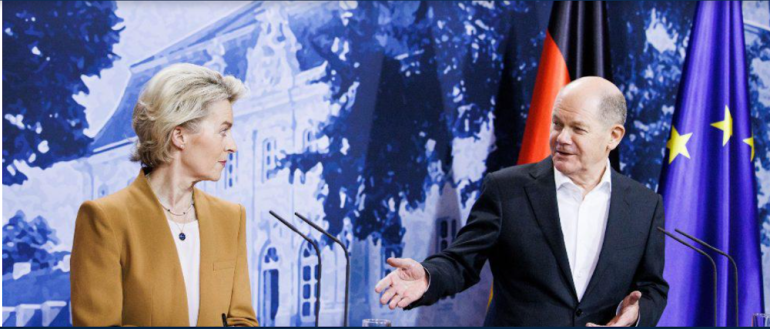Just over a year ago, when Russia attacked Ukraine, German Chancellor Olaf Scholz made his groundbreaking Zeitenwendespeech to the Bundestag.
He promised a sea change in German foreign and defense policy. An extra €100 billion ($107 billion) would be allocated to the armed forces. Berlin would provide Ukraine with military assistance, ending its ban on sending weapons to conflict zones. Germany would stop the controversial Nord Stream 2 pipeline that made Berlin increasingly dependent on Russian gas and provided President Vladimir Putin with a powerful instrument to blackmail Germany.
It was never going to be easy for Scholz’s coalition of Social Democrats, Greens, and Free Democrats to change their mindsets.
Les illusions de l’Ostpolitik dissipées
For decades Germany could depend on the security umbrella provided by the United States on the one hand and, on the other, continue its Ostpolitik toward Russia—an “eastern policy” based on trade, energy, and a plethora of economic, social, and political contacts. The latter stemmed from what turned out to be a naïve belief that these ties would bring Russia closer to Europe and lead to greater stability and security.
Putin’s attack on Ukraine a year ago is now finally changing Germany in ways that will affect its relationship with the EU, the United States, and Eastern Europe. At least, that is the hope.
First, consider the EU. The war in Ukraine has for the moment put paid to Europe’s ambitions for strategic autonomy, a woolly term that was flawed from the beginning. The EU and most of its member states don’t have a strategic outlook, let alone a common threat perception.
Pas de sécurité européenne sans les Etats-Unis ?
The way in which U.S. President Joe Biden threw his military, political, and financial support behind Ukraine was crucial for getting the Europeans on board. Washington’s role was also instructive. The war exposed Europe’s weak military capabilities and confirmed American leadership.
Most crucially, after considerable reluctance by Germany and France to unequivocally rally around Kyiv and understand how Putin’s war against Ukraine was also about threatening the security of Europe, Berlin has no qualms about the value of the transatlantic relationship. The reality has sunk in that Europe’s security is a paper tiger without the United States. That’s not an ideal situation for Washington.
The war in Ukraine should convince all EU governments that the security of the continent requires a major overhaul of how defense is organized. That is one of the core principles of the Zeitenwende—which has, since Scholz’s speech, been dubbed the Zeitlupenwende, or slow motion change, to reflect the Bundeswehr’s slow transformation.
It is not about spending more money. It is about how the money is spent, how governments collaborate and cooperate over equipment, training, and the modernization of the armed forces. It is about resilience that Germany and its allies need to embrace.
La politique économique allemande a changé
Scholz and especially his Green coalition partners are translating some of this resilience into reality. With a speed out of character given the battery of required planning procedures, German Minister for Economic Affairs and Climate Action Robert Habeck cut through mountains of red tape, procrastination, and lobbies. Over the past several months, liquefied natural gas terminals were built and put on stream. Today, German dependence on Russian gas has dwindled to almost zero. This is important for the EU. It means Germany is now committed not only to diversifying its energy sources but also speeding up the renewable energy sector. And in terms of the energy relationship with Russia, returning to the status quo ante is not possible.
Consolider l’Euope à l’Ouest et à l’Est
This matters for Germany’s foreign policy and its approach to the EU. Russia’s war on Ukraine necessitates a more integrated Europe, particularly in energy, cybersecurity, and defense spending, which European Commission President Ursula von der Leyen keeps promoting. For these to happen, Germany has to push for more integration, recognizing how the war has to prepare Europe for dealing with the changing nature of security and resilience. These complement NATO’s role.
Then there is Eastern Europe. Germany’s perception of these countries is changing, again because of the war in Ukraine. Successive German governments looked at its Eastern neighbors through the prism of Russia. Those days are over. Russia’s attack on Ukraine showed the vulnerability of Armenia, Belarus, Georgia, and Moldova, where Russian meddling is a major threat to independence and sovereignty.
That meddling puts the security and stability of the region at risk, with repercussions for the EU. That is why Scholz’s government needs to work much more closely with the Baltic States, the Czech Republic, and Poland—whose anti-German Law and Justice government makes cooperation difficult.
Berlin will also be able to rely on the Nordic countries to come up with security and trade policies to protect the sovereignty of the EU’s Eastern neighborhood. This is not about holding out the long-term prospect of joining the EU. It is about strengthening the state institutions of these countries. This should involve underpinning an independent judiciary, training a professional civil service and police forces, and combatting corruption. NATO, in the meantime, could increase its military training role.
None of the above is rocket science. It is about commitments and necessities. Europe is in the post-1989 phase. It is up to Germany and its allies to shape the next phase. It will require hard-nosed policies. Eventually, even hard power. It is a Zeitenwende.
Carnegie does not take institutional positions on public policy issues ; the views represented herein are those of the author(s) and do not necessarily reflect the views of Carnegie, its staff, or its trustees.


